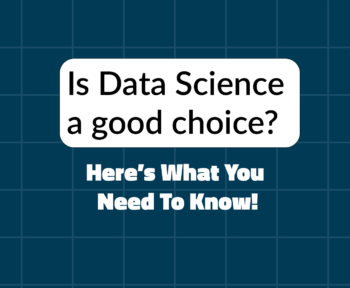Are you looking to start your career in data science? With the growing demand for data scientists across various industries, it can be a competitive job market to navigate. But don’t worry, this blog offers data science roadmap, tips, tricks, and advice on how to land your first data science job. From understanding the job market to acing the interview process, we’ve got you covered.
Understanding the Data Science Job Market
Before you start your job search, it’s important to understand the demand for data scientists and where they are most needed. Data science jobs are in high demand across various industries, including technology, healthcare, finance, and e-commerce. According to Glassdoor, data scientist is one of the top 10 best jobs in the United States in terms of salary, job satisfaction, and job openings.
The Growing Demand for Data Science Jobs
As organizations collect and analyze more data, the need for data scientists has grown tremendously. In fact, the U.S. Bureau of Labor Statistics predicts that employment of computer and information research scientists, which includes data scientists, will grow by 15% from 2019 to 2029.
The growing demand for data science jobs can be attributed to the fact that organizations are recognizing the value of data-driven decision making. Data scientists are able to analyze large amounts of data and extract insights that can help organizations make informed decisions. With the rise of big data, machine learning, and artificial intelligence, the demand for data scientists is expected to continue to grow.
Key Industries Employing Data Scientists
Data science jobs can be found in a range of industries. Here are some examples:
- Technology companies: Prominent employers of data scientists include Google, Amazon, and Facebook. These companies utilize data science to improve their products and services, personalize user experiences, and optimize their operations.
- Healthcare and pharmaceutical companies: These organizations have data science jobs focused on analyzing patient data and developing personalized treatments.
- Finance and banking: Data scientists in this sector play a crucial role in detecting fraud, assessing risk, and developing trading algorithms.
- E-commerce companies: Data science is utilized by e-commerce companies to enhance their supply chain management, optimize pricing strategies, and personalize their marketing efforts.
Identifying Your Niche in Data Science
Data science is a broad field, and it’s important to identify your strengths and interests to help guide your job search. Are you more interested in artificial intelligence and machine learning? Or do you prefer working with big data and analytics?
Identifying your niche can help you tailor your data science job search and showcase your expertise to potential employers. If you’re interested in machine learning, for example, you may want to focus your job search on companies that are developing intelligent systems or working on natural language processing. If you’re interested in big data and analytics, you may want to look for jobs in the finance or e-commerce industries, where data is a critical part of the business.
Ultimately, the key to a successful career in data science is to stay up-to-date with the latest trends and technologies in the field. Whether you’re just starting out or you’re a seasoned data scientist, there are always new skills to learn and new challenges to tackle.
Essential Skills and Qualifications for Data Science Jobs
Data science is a rapidly growing field, and as such, the skills and qualifications required for data science jobs are constantly evolving. However, there are some essential skills and qualifications that are consistently in demand. Here are the key areas to focus on:
Technical Skills and Programming Languages:
- Python: Used for data cleaning, analysis, and machine learning.
- R: Designed specifically for statistical computing and graphics.
- SQL: Essential for managing and manipulating databases.
- Java and C++: Useful for developing machine learning algorithms.
Statistical and Analytical Skills:
- Data modeling techniques: Creating mathematical representations of real-world systems.
- Hypothesis testing: Testing hypotheses about population parameters using sample data.
- Data visualization: Creating visual representations of data to communicate insights.
Domain Knowledge and Industry Expertise:
Having knowledge of specific industries or subjects can bring significant value to data science jobs. Domain knowledge plays a crucial role in gaining a better understanding of the data and asking more informed questions. Furthermore, it aids in effectively communicating findings to industry stakeholders, ensuring that insights are conveyed in a meaningful and impactful way.
Soft Skills for Success in Data Science:
- Communication: Presenting complex data to non-technical stakeholders.
- Collaboration: Working effectively in cross-functional teams.
- Problem-solving: Thinking creatively to tackle complex data science challenges.
Now, let’s summarize the information in a table for better clarity:
| Skills and Qualifications | Purpose and Application |
|---|---|
| Technical Skills | – Python, R, SQL, Java, and C++: Used for data manipulation and analysis, machine learning, and database management |
| Statistical and Analytical Skills | – Data modeling, hypothesis testing, and data visualization: Applied to draw insights from data |
| Domain Knowledge and Industry Expertise | – Industry-specific knowledge enhances understanding of data and improves communication with stakeholders |
| Soft Skills | – Communication, collaboration, and problem-solving: Essential for effective teamwork and presentation of findings |
Building a Strong Data Science Portfolio
In today’s data-driven world, data science has become a critical component of many industries. As a result, the demand for skilled data scientists has skyrocketed. However, with so many candidates vying for these positions, it’s important to have a strong data science portfolio that sets you apart from the competition.
Here are some ways to build a strong data science portfolio:
Showcasing Your Projects and Experience
One of the best ways to demonstrate your skills and experience is by showcasing your data science projects. When building your portfolio, make sure to include a brief summary of the project, the tools and techniques used, and any insights gained from the analysis. This will give potential employers a better understanding of your capabilities and how you approach data science problems. Additionally, make sure to highlight any projects relevant to the industry or niche you are interested in. This will show that you have a deep understanding of the industry and can apply your skills to real-world problems.
Demonstrating Your Skills Through Competitions
Participating in data science competitions such as Kaggle can demonstrate your problem-solving abilities and showcase your technical expertise. These competitions often require participants to work with large and complex datasets, which can be a great way to showcase your data wrangling and analysis skills. Additionally, employers often look for candidates who have successfully competed in such events, as it demonstrates a level of commitment and passion for the field.
Creating a Compelling GitHub Profile
Creating a GitHub profile that showcases your code and data science projects is another great way to build your portfolio. Make sure your profile is clean, organized, and easy to navigate. This will make it easier for potential employers of data science jobs to find and review your work. Additionally, you can add link to your GitHub profile on your resume and other job search platforms, making it easier for recruiters to find you.
Blogging and Sharing Your Knowledge
Writing blog posts and sharing your knowledge on data science topics can help establish you as a thought leader in the industry. It also demonstrates your ability to communicate complex information in a clear and concise manner. When writing blog posts, make sure to focus on topics that are relevant to the industry or niche you are interested in. This will show potential employers that you have a deep understanding of the field and can communicate your ideas effectively.
Networking and Finding Data Science Job Opportunities
Now that you have built a strong data science portfolio, let’s explore ways to network and find job opportunities.
Networking and finding data science jobs can be a daunting task, but there are many ways to approach it. Let’sl explore some additional methods to help you expand your network and find your dream data science job.
Attending Data Science Meetups and Conferences
Attending data science meetups and conferences can be a great way to network with industry professionals and learn about new trends and technologies. However, it can also be overwhelming to navigate these events, especially if you are new to the field.
To make the most out of these events, it’s important to come prepared. Research the speakers and topics beforehand, and come up with a list of questions you want to ask. This will help you engage with the speakers and other attendees, and make meaningful connections.
Furthermore, don’t be afraid to step out of your comfort zone and approach people. Introduce yourself, exchange business cards, and follow up with them after the event. This will help you build a strong network of contacts in the industry.
Leveraging LinkedIn for Job Search and Networking
LinkedIn is a powerful tool for job searching and networking, but it can be overwhelming to use. To make the most out of LinkedIn, you need to have a complete and up-to-date profile, and actively engage with the platform.
One way to do this is by joining relevant groups and communities on LinkedIn. This will help you connect with other professionals in your field, and stay up-to-date with the latest industry news and trends.
Another way to leverage LinkedIn is by using its search function to find potential employers and data science jobs. Use relevant keywords and filters to narrow down your search, and reach out to recruiters and hiring managers with personalized messages.
Joining Data Science Communities and Forums
Joining data science communities and forums can be a great way to learn from others and share your knowledge and expertise. However, it’s important to approach these communities with a mindset of collaboration and mutual learning.
One way to do this is by participating in discussions and sharing your insights and experiences. This will help you build a reputation as a thought leader in your field, and potentially attract job opportunities.
Furthermore, don’t be afraid to reach out to other members of the community for advice and mentorship. This can help you expand your network and gain valuable insights into the industry.
Reaching Out to Industry Professionals and Mentors
Reaching out to industry professionals and mentors can be intimidating, but it can also be a great way to gain valuable insights and potentially find job opportunities.
When reaching out to professionals and mentors, it’s important to be respectful and concise. Introduce yourself, explain your goals and interests, and ask for their advice or insights. Avoid asking for a job directly, as this can come across as pushy and unprofessional.
Furthermore, don’t be discouraged if you don’t receive a response right away. Many professionals and mentors are busy, and may not have the time to respond to every message they receive. Follow up with a polite reminder after a few weeks, and continue to build your network in the meantime.
Overall, networking and finding job opportunities can be a challenging process, but with persistence and a proactive mindset, you can build a strong network and find your dream job. Good luck!
Crafting an Effective Resume and Cover Letter for Data Science Jobs
Are you looking to land your dream job in data science? Crafting an effective resume and cover letter is crucial to making a great first impression on potential employers. Here are some tips to help you stand out from the crowd:
Highlighting Your Relevant Skills and Experience
When it comes to your resume, make sure to highlight your relevant skills and experience. This is your chance to showcase your technical abilities and demonstrate your expertise. Be sure to tailor your resume to the specific data science job you are applying for. Use bullet points to highlight your technical skills and projects, and provide specific examples of your accomplishments.
For example, if you are applying for a data science job that requires experience with machine learning, highlight your experience with algorithms and models. If you have experience with Python, R, or SQL, make sure to mention it in your resume.
Tailoring Your Resume for Each Job Application
Every job application is unique, so it’s important to tailor your resume and cover letter to the specific job you are applying for. This means customizing your resume to match the job description and requirements. Use keywords and phrases from the job description, and highlight your relevant experience and accomplishments.
Don’t just copy and paste your resume for each job application. Take the time to read the job description carefully and make sure your resume reflects the skills and experience required for the position.
Writing a Persuasive Cover Letter
Your cover letter is your chance to make a great first impression on potential employers. It should be customized to the job and company you are applying to. Use it to showcase your passion for data science and your specific interest in the company. Be sure to highlight your relevant skills and experience.
For example, if you are applying for a data science job in a healthcare company, you might mention your interest in using data to improve patient outcomes. If you are applying for a job in a marketing firm, you might highlight your experience with analyzing customer behavior and developing marketing strategies.
Including Links to Your Portfolio and Online Presence
It’s important to include links to your portfolio, GitHub profile, and any other relevant online presence in your resume and cover letter. This will give hiring managers a more in-depth view of your skills and experience. Make sure your online presence is up-to-date and showcases your best work.
For example, if you have a portfolio website, make sure it is easy to navigate and includes your most impressive projects. If you have a GitHub profile, make sure it is well-organized and includes detailed descriptions of your projects.
By following these tips, you can craft an effective data science resume and cover letter that will help you stand out from the competition and land your dream data science job.
Acing Data Science Job Interviews
If you’ve made it to the interview process – congratulations! Let’s explore how to ace the interview process and showcase your skills and expertise.
Preparing for Technical and Behavioral Questions
Data science interviews often include technical and behavioral questions. Research common data science interview questions and practice your responses. Be sure to know your technical skills and be prepared to answer hypothetical questions.
Demonstrating Your Problem-Solving Abilities
Data scientists are problem solvers, so it’s important to demonstrate your problem-solving abilities during the interview process. Be prepared to work through hypothetical scenarios and provide examples of how you have solved similar problems in the past.
Communicating Your Passion for Data Science
In addition to showcasing your technical skills, it’s important to communicate your passion for data science and the industry. Hiring managers want to see that you are enthusiastic about the data science job and eager to learn and grow.
Following Up After the Interview
After the interview, be sure to send a thank-you email or note. It shows that you are interested in the job and appreciate their time. Following up can also help keep you top-of-mind during the hiring process.
Evaluating and Negotiating Job Offers
Congratulations, if you received a job offer! Before accepting, let’s explore how to evaluate and negotiate job offers.
Assessing Company Culture and Growth Opportunities
Assess the company culture and growth opportunities before accepting a job offer. It’s important to consider whether the company aligns with your values and whether there is room for growth and advancement.
Comparing Compensation Packages
Compare the compensation package to other job offers and industry norms. Consider the salary, benefits, and any other perks offered.
Negotiating Salary and Benefits
Don’t be afraid to negotiate your salary and benefits. Research industry norms and the company’s budget beforehand, and be prepared to make a counteroffer.
Making the Final Decision and Starting Your Data Science Career
After evaluating the job offer, it’s time to make the final decision and start your data science career. Congratulations on landing your first data science job!





